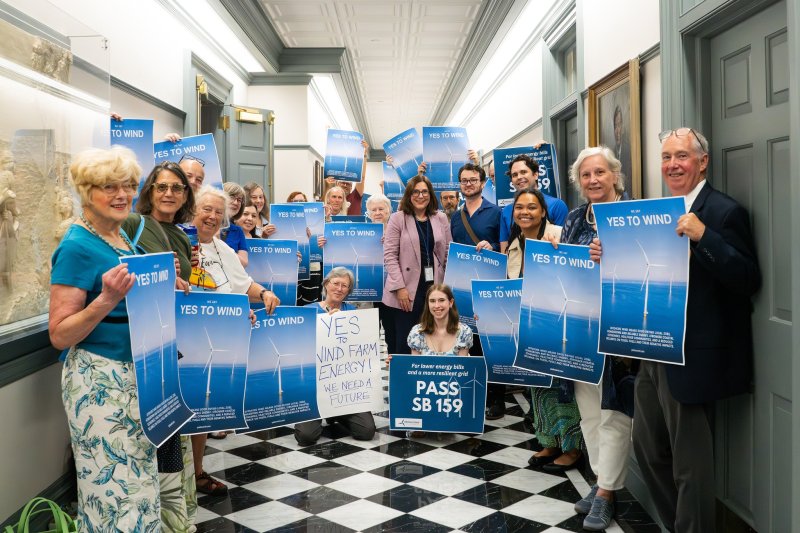A partisan impasse over one bill to bring offshore wind to Delaware’s coast was resolved late June 30 through separate bi-partisan legislation to push back the bill’s implementation date.
Using the three-quarters vote needed to pass the bond bill as leverage, Republicans withheld votes June 26, leaving the bond bill two votes shy of the 16 needed to pass the nearly $1 billion in funding for infrastructure and state facility improvements.
In return, they secured a delay in the implementation of Senate Bill 159, the offshore wind bill, pushing the date to Jan. 31, 2026, essentially allowing a court case filed by US Wind against Sussex County Council regarding its denial of a conditional use to play out.
“These agreements are the result of standing firm for local control, protecting the integrity of our courts …,” said Senate Republican Leader Gerald Hocker, R-Ocean View, and Senate Republican Whip Brian Pettyjohn, R-Georgetown, in a statement released after 1 a.m., July 1. “Because of this compromise, the General Assembly was able to move forward and pass the bond bill, which will provide critical funding for vital capital improvement projects that benefit communities across the state.”
Allowing the courts to decide the case was a plea voiced by several Sussex County representatives and senators as SB 159 was passed by the General Assembly June 30 and promptly signed into law by Gov. Meyer. According to Meyer’s press secretary Rachel Sawicki, Senate Bill 199, the bill delaying implementation, was also signed followed its passage.
SB 199 was brought to the floor through suspension of rules by both the House and the Senate and passed nearly unanimously by both.
Rep. Claire Snyder-Hall, D-Rehoboth Beach, House sponsor of both SB 159 and SB 199, said SB 199 delays the effective date of SB 159 from June 30, the day it was signed by Meyer, to Jan. 31, 2026.
Senate President Pro Tempore Dave Sokola, D-Newark, said, “This took a lot of discussion from leadership of all four caucuses, and we believe this is a step forward that will benefit the State of Delaware.”
Speaking before SB 159 was passed in the House 25-15, Rep. Valerie Jones Giltner, R-Georgetown, said she agrees the General Assembly has the right to determine the energy policy for the state, but it does not have the right to infringe upon the powers of the judicial system.
“US Wind has already appealed Sussex County’s decision to the Delaware Superior Court, and that decision is actively pending,” she said. “By bringing this legislation forward, we violate the separation of powers since it will … bring to a standstill a matter under the jurisdiction of the Delaware courts.”
Pettyjohn echoed those concerns before the bill passed the Senate 15-6, and warned of the precedent the bill sets to undermine local rule.
“This casts the mold for the next project that either we want here in this building that our local officials don’t want or vice versa … that’s going to come next, I guarantee you,” he said.
Senate Majority Leader Bryan Townsend, D-Glasgow, said the bill is not meant to disrespect local control, and many conversations were made in the final days of session to reach a resolution.
“But when you have one specific decision that we know through private conversation with opponents of this bill is legally dubious in the first place, we cannot afford not to act,” he said. “Courts are often plenty fine having elected officials finding solutions and not just kicking it to the courts.”
Snyder-Hall said SB 159 is not intended as a slap in the face to Sussex County Council. The General Assembly has the authority to decide whether the US Wind project goes forward and “it is not an insult to anyone or any other body of government,” she said.
“SB 159 is not an attempt to take over the rightful authority of Sussex County Council over zoning. They already zoned the area heavy industrial,” Snyder-Hall said. “In other words, SB 159 does not violate local control but simply reclaims for the General Assembly their rightful authority to determine energy policy for the state.”
The project needs to move forward to provide more energy to the regional power grid, Snyder-Hall said, and the project will also provide good-paying union jobs.
Sen. Stephanie Hansen, D-Middletown, the bill sponsor, stressed to the Senate that the bill only affects the US Wind project. She said she reached out to the Sussex County administrator to resolve the issue without the legislation, but they were unable to do so.
Pettyjohn said power generation goes beyond wind power, and has more to do with aging power plants that need to be fixed so they can produce more energy for the grid.
“None of that is going to be solved by passing SB 159. Our capacity issue this year, next year, the year after that … is not going to be solved by passing SB 159,” he said.
Rep. Rich Collins, R-Millsboro, said the issue with power is not wind or solar, but that power plants have been shut down because of government policy.
“What they need is power they can turn a switch on and it works,” he said, adding that coal, nuclear and natural gas provide the steady power flow needed for the grid.
Already, he said the federal government is looking to end wind subsidies, which will put the project in jeopardy.
Melissa Steele is a staff writer covering the state Legislature, government and police. Her newspaper career spans more than 30 years and includes working for the Delaware State News, Burlington County Times, The News Journal, Dover Post and Milford Beacon before coming to the Cape Gazette in 2012. Her work has received numerous awards, most notably a Pulitzer Prize-adjudicated investigative piece, and a runner-up for the MDDC James S. Keat Freedom of Information Award.























































